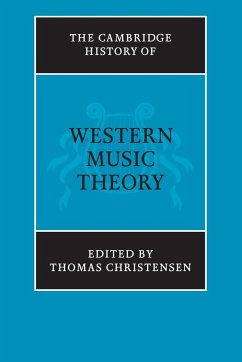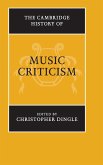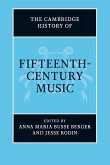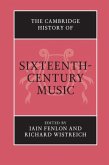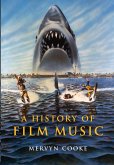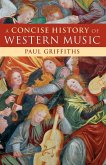Thomas Christensen (ed.)
The Cambridge History of Western Music Theory
Herausgeber: Christensen, Thomas
Thomas Christensen (ed.)
The Cambridge History of Western Music Theory
Herausgeber: Christensen, Thomas
- Broschiertes Buch
- Merkliste
- Auf die Merkliste
- Bewerten Bewerten
- Teilen
- Produkt teilen
- Produkterinnerung
- Produkterinnerung
The Cambridge History of Western Music Theory is the first comprehensive history of Western music theory to be published in the English language. A collaborative project by leading music theorists and historians, the volume traces the rich panorama of music-theoretical thought from the Ancient Greeks to the present day.
Andere Kunden interessierten sich auch für
![The Cambridge History of Music Criticism The Cambridge History of Music Criticism]() The Cambridge History of Music Criticism160,99 €
The Cambridge History of Music Criticism160,99 €![The Cambridge History of Fifteenth-Century Music The Cambridge History of Fifteenth-Century Music]() The Cambridge History of Fifteenth-Century Music52,99 €
The Cambridge History of Fifteenth-Century Music52,99 €![The Cambridge History of Sixteenth-Century Music The Cambridge History of Sixteenth-Century Music]() The Cambridge History of Sixteenth-Century Music35,99 €
The Cambridge History of Sixteenth-Century Music35,99 €![The Shortest History of Music The Shortest History of Music]() Andrew FordThe Shortest History of Music14,99 €
Andrew FordThe Shortest History of Music14,99 €![The Shortest History of Music The Shortest History of Music]() Andrew FordThe Shortest History of Music16,99 €
Andrew FordThe Shortest History of Music16,99 €![A History of Film Music A History of Film Music]() Mervyn Cooke (University of Nottingham)A History of Film Music41,99 €
Mervyn Cooke (University of Nottingham)A History of Film Music41,99 €![A Concise History of Western Music A Concise History of Western Music]() Paul GriffithsA Concise History of Western Music31,99 €
Paul GriffithsA Concise History of Western Music31,99 €-
-
-
The Cambridge History of Western Music Theory is the first comprehensive history of Western music theory to be published in the English language. A collaborative project by leading music theorists and historians, the volume traces the rich panorama of music-theoretical thought from the Ancient Greeks to the present day.
Produktdetails
- Produktdetails
- The Cambridge History of Music
- Verlag: Cambridge University Press
- Seitenzahl: 1024
- Erscheinungstermin: 20. April 2006
- Englisch
- Abmessung: 229mm x 152mm x 55mm
- Gewicht: 1458g
- ISBN-13: 9780521686983
- ISBN-10: 0521686989
- Artikelnr.: 20974118
- Herstellerkennzeichnung
- Libri GmbH
- Europaallee 1
- 36244 Bad Hersfeld
- gpsr@libri.de
- The Cambridge History of Music
- Verlag: Cambridge University Press
- Seitenzahl: 1024
- Erscheinungstermin: 20. April 2006
- Englisch
- Abmessung: 229mm x 152mm x 55mm
- Gewicht: 1458g
- ISBN-13: 9780521686983
- ISBN-10: 0521686989
- Artikelnr.: 20974118
- Herstellerkennzeichnung
- Libri GmbH
- Europaallee 1
- 36244 Bad Hersfeld
- gpsr@libri.de
Thomas Christensen is Professor of Music and the Humanities at the University of Chicago.
Introduction Thomas Christensen
Part I. Disciplining Music Theory: 1. Mapping the terrain Leslie Blasius
2. Musica practica: music theory as pedagogy Robert W. Wason
3. Epistemologies of music theory Nicholas Cook
Part II. Speculative Traditions: 4. Greek music theory Thomas J. Mathiesen
5. The transmission of ancient music theory into the Middle Ages Calvin Bower
6. Medieval canonics Jan Herlinger
7. Tuning and temperament Rudolf Rasch
8. The role of harmonics in the scientific revolution Penelope Gouk
9. From acoustics to tonpsychologie Burdette Green and David Butler
10. Music theory and mathematics Catherine Nolan
Part III. Regulative Traditions: 11. Notes, scales, and modes in Carolingian thought David Cohen
12. Renaissance modal theory: theoretical, compositional and editorial perspectives Cristle Collins Judd
13. Tonal organization in seventeenth-century music theory Gregory Barnett
14. Dualist tonal space and transformation in the nineteenth century Henry Klumpenhouwer
15. Organum, diaphonia, discantus, contrapunctus in the Middle Ages Sarah Fuller
16. Counterpoint pedagogy in the Renaissance Peter Schubert
17. Performance theory Albert Cohen
18. Steps to Parnassus: contrapuntal theory in 1725: precursors and successors Ian Bent
19. Twelve-tone theory John Covach
20. The evolution of rhythmic notation Anna Maria Busse Berger
21. Theories of musical rhythm in the eighteenth and nineteenth centuries William Caplin
22. Rhythm in twentieth-century theory Justin London
23. Tonality Brian Hyer
24. Rameau and eighteenth-century harmonic theory Joel Lester
25. Nineteenth-century harmonic theory: the Austro-German legacy David W. Bernstein
26. Heinrich Schenker William Drabkin
Part IV. Descriptive Traditions: 27. Music and rhetoric Patrick McCreless
28. Form Scott Burnham
29. Thematic and motivic analysis Jonathan Dunsby
30. Energetics Lee Rothfarb
31. The psychology of music Robert Gjerdingen.
Part I. Disciplining Music Theory: 1. Mapping the terrain Leslie Blasius
2. Musica practica: music theory as pedagogy Robert W. Wason
3. Epistemologies of music theory Nicholas Cook
Part II. Speculative Traditions: 4. Greek music theory Thomas J. Mathiesen
5. The transmission of ancient music theory into the Middle Ages Calvin Bower
6. Medieval canonics Jan Herlinger
7. Tuning and temperament Rudolf Rasch
8. The role of harmonics in the scientific revolution Penelope Gouk
9. From acoustics to tonpsychologie Burdette Green and David Butler
10. Music theory and mathematics Catherine Nolan
Part III. Regulative Traditions: 11. Notes, scales, and modes in Carolingian thought David Cohen
12. Renaissance modal theory: theoretical, compositional and editorial perspectives Cristle Collins Judd
13. Tonal organization in seventeenth-century music theory Gregory Barnett
14. Dualist tonal space and transformation in the nineteenth century Henry Klumpenhouwer
15. Organum, diaphonia, discantus, contrapunctus in the Middle Ages Sarah Fuller
16. Counterpoint pedagogy in the Renaissance Peter Schubert
17. Performance theory Albert Cohen
18. Steps to Parnassus: contrapuntal theory in 1725: precursors and successors Ian Bent
19. Twelve-tone theory John Covach
20. The evolution of rhythmic notation Anna Maria Busse Berger
21. Theories of musical rhythm in the eighteenth and nineteenth centuries William Caplin
22. Rhythm in twentieth-century theory Justin London
23. Tonality Brian Hyer
24. Rameau and eighteenth-century harmonic theory Joel Lester
25. Nineteenth-century harmonic theory: the Austro-German legacy David W. Bernstein
26. Heinrich Schenker William Drabkin
Part IV. Descriptive Traditions: 27. Music and rhetoric Patrick McCreless
28. Form Scott Burnham
29. Thematic and motivic analysis Jonathan Dunsby
30. Energetics Lee Rothfarb
31. The psychology of music Robert Gjerdingen.
Introduction Thomas Christensen
Part I. Disciplining Music Theory: 1. Mapping the terrain Leslie Blasius
2. Musica practica: music theory as pedagogy Robert W. Wason
3. Epistemologies of music theory Nicholas Cook
Part II. Speculative Traditions: 4. Greek music theory Thomas J. Mathiesen
5. The transmission of ancient music theory into the Middle Ages Calvin Bower
6. Medieval canonics Jan Herlinger
7. Tuning and temperament Rudolf Rasch
8. The role of harmonics in the scientific revolution Penelope Gouk
9. From acoustics to tonpsychologie Burdette Green and David Butler
10. Music theory and mathematics Catherine Nolan
Part III. Regulative Traditions: 11. Notes, scales, and modes in Carolingian thought David Cohen
12. Renaissance modal theory: theoretical, compositional and editorial perspectives Cristle Collins Judd
13. Tonal organization in seventeenth-century music theory Gregory Barnett
14. Dualist tonal space and transformation in the nineteenth century Henry Klumpenhouwer
15. Organum, diaphonia, discantus, contrapunctus in the Middle Ages Sarah Fuller
16. Counterpoint pedagogy in the Renaissance Peter Schubert
17. Performance theory Albert Cohen
18. Steps to Parnassus: contrapuntal theory in 1725: precursors and successors Ian Bent
19. Twelve-tone theory John Covach
20. The evolution of rhythmic notation Anna Maria Busse Berger
21. Theories of musical rhythm in the eighteenth and nineteenth centuries William Caplin
22. Rhythm in twentieth-century theory Justin London
23. Tonality Brian Hyer
24. Rameau and eighteenth-century harmonic theory Joel Lester
25. Nineteenth-century harmonic theory: the Austro-German legacy David W. Bernstein
26. Heinrich Schenker William Drabkin
Part IV. Descriptive Traditions: 27. Music and rhetoric Patrick McCreless
28. Form Scott Burnham
29. Thematic and motivic analysis Jonathan Dunsby
30. Energetics Lee Rothfarb
31. The psychology of music Robert Gjerdingen.
Part I. Disciplining Music Theory: 1. Mapping the terrain Leslie Blasius
2. Musica practica: music theory as pedagogy Robert W. Wason
3. Epistemologies of music theory Nicholas Cook
Part II. Speculative Traditions: 4. Greek music theory Thomas J. Mathiesen
5. The transmission of ancient music theory into the Middle Ages Calvin Bower
6. Medieval canonics Jan Herlinger
7. Tuning and temperament Rudolf Rasch
8. The role of harmonics in the scientific revolution Penelope Gouk
9. From acoustics to tonpsychologie Burdette Green and David Butler
10. Music theory and mathematics Catherine Nolan
Part III. Regulative Traditions: 11. Notes, scales, and modes in Carolingian thought David Cohen
12. Renaissance modal theory: theoretical, compositional and editorial perspectives Cristle Collins Judd
13. Tonal organization in seventeenth-century music theory Gregory Barnett
14. Dualist tonal space and transformation in the nineteenth century Henry Klumpenhouwer
15. Organum, diaphonia, discantus, contrapunctus in the Middle Ages Sarah Fuller
16. Counterpoint pedagogy in the Renaissance Peter Schubert
17. Performance theory Albert Cohen
18. Steps to Parnassus: contrapuntal theory in 1725: precursors and successors Ian Bent
19. Twelve-tone theory John Covach
20. The evolution of rhythmic notation Anna Maria Busse Berger
21. Theories of musical rhythm in the eighteenth and nineteenth centuries William Caplin
22. Rhythm in twentieth-century theory Justin London
23. Tonality Brian Hyer
24. Rameau and eighteenth-century harmonic theory Joel Lester
25. Nineteenth-century harmonic theory: the Austro-German legacy David W. Bernstein
26. Heinrich Schenker William Drabkin
Part IV. Descriptive Traditions: 27. Music and rhetoric Patrick McCreless
28. Form Scott Burnham
29. Thematic and motivic analysis Jonathan Dunsby
30. Energetics Lee Rothfarb
31. The psychology of music Robert Gjerdingen.

